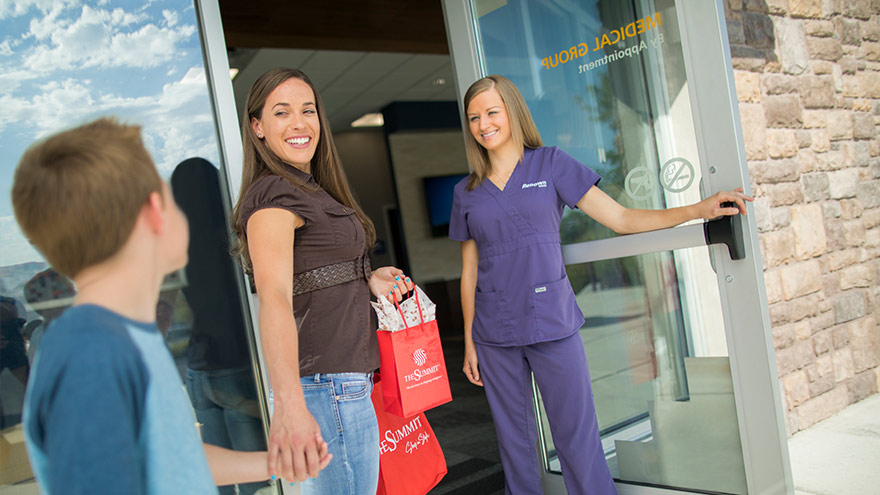Buscar
-
Getting Care During The Holidays
Although coined the most wonderful time of the year, the holiday season can unfortunately bring with it injuries and illness. Woke up on Christmas morning with the gift of a sore throat and fever? Sliced your finger carving the delicious turkey you spent all day preparing? While no one ever wants to cut their festivities short, the reality is we should all be prepared with how and where we will receive care should we need it. Are Renown Urgent Care Facilities Open During the Holidays? Renown Urgent Care sees patients 365 days a year, with limited hours on holidays, for medical concerns that are urgent but not life-threatening. Urgent care providers can treat everything from cuts and burns to fevers and allergic reactions and appointments can be booked ahead of time online. If no appointments are available, you may also walk into any of our various urgent care facilities. Conditions and injuries treated at urgent care include: Cuts Fractures Burns Sprains Fevers Allergic reactions Animal bites Rashes Sore throats Does Renown Offer In-Home Care Options on Holidays? If you’d like to see a healthcare provider without leaving the house and exposing others to illness, consider a Virtual Urgent Care Visit. This convenient video conference service allows you to see an urgent care provider from the comfort of your home using a cellphone, computer or tablet with video capabilities. Providers are available for video chat from 9 a.m. to 6 p.m. Monday through Friday, and 10 a.m. to 4 p.m. Saturday and Sunday. Scheduling a Virtual Visit is easy directly through MyChart. Login to MyChart and click on the "Talk to a doctor" video icon within the portal to get started. Before scheduling, be sure your illness or injury is included on the following list to ensure a healthcare provider can assist you virtually: Common cold and cough symptoms Muscular, tendon or joint pains not caused by injury Allergy or sinus symptoms Pink eye (no trauma or something in the eye) Urinary discomfort Diarrhea without vomiting Rashes or skin sores Backache Nail problems Screening examination for sexually transmitted illness (without symptoms) Medication refills (not controlled substances) When Should I Go to the Emergency Room? Urgent care and Virtual Visits are great options when experiencing minor illness or injury and it’s too urgent to see your primary care provider. Renown Emergency Rooms are designed to treat patients who need immediate attention for emergencies, such as: Burns Allergic reactions Broken bones Stitches Skin infections Heart attack Stroke Rashes Venomous stings and bites Asthma attacks Choking or poisoning Fainting, dizziness or confusion Head injuries Seizures Severe bleeding Difficulty breathing Severe headache Eye injuries Severe pain Renown Emergency Rooms are open 24 hours a day, 7 days a week, 365 days a year. For life-threatening emergencies, always call 9-1-1 immediately. We know there is nothing jolly about getting sick or injured during the holidays, but we hope you can find some comfort knowing that Renown Health is here with the care you need, when you need it most.
-
How to Talk to Your Vaccine-Hesitant Friends About Getting Vaccinated Against COVID-19
Roughly 59% of eligible Nevadans are fully vaccinated against COVID-19 as of mid-September. That number is up 9% from only a month ago, but our work is far from done! One of the most powerful ways to convince someone to get vaccinated is for a person they trust and respect to take the time and have that complicated conversation with them. We know these conversations can be daunting, so we consulted Marie McCormack, MD, Primary Care Division Chief at Renown, about the six best ways to approach and frame these conversations to be productive and effective. 1. Be firm, but not aggressive. 2. Listen to what they have to say, and don’t assume you know why they haven't gotten the vaccine yet. 3. Cater your responses to their concerns. The CDC even has a helpful reference table identifying main reasons people are not getting vaccinated. If they are scared, offer to go with them. If they are not worried about getting sick, explain that they are more at risk of infecting those around them who are more likely to have a severe reaction to the virus. If they don’t know how to make an appointment, help them find the most convenient time and place for their schedule. If they are worried about how fast the vaccine was developed, remind them that the mRNA technology used in these vaccines has been studied for years. If they are worried the vaccine will affect fertility, tell them that in August the CDC officially recommended that pregnant people can get vaccinated. 4. When in doubt, hit them with the stats! 1 in 500 Americans has died from COVID-19. Vaccinated people are nearly five times less likely to get infected, according to the CDC. Vaccinated people are 10 times less likely to get so sick they ended up in the hospital, according to the CDC. 5. Remind them of all the things they might not be able to do if they aren't vaccinated. Attend concerts or sporting events Travel Potentially even keep their job 6. When all else fails, use the tough love approach. Tell these people you don’t feel comfortable meeting with them in person until they are vaccinated.

